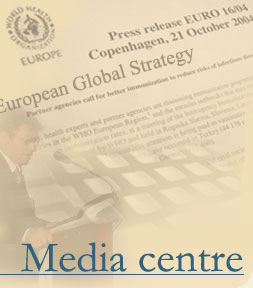Strengthening the heart of public health: European Health21 nurse and midwife campaign launched
Copenhagen
In a new initiative to strengthen the impact that nurses and midwives have on improving health, particularly for those most at risk, the WHO Regional Office for Europe, the International Council of Nurses (ICN) and the International Council of Midwives (ICM) issued a joint call today for a Europe-wide Health21 nurse and midwife public health campaign.The more than 5 million nurses and midwives practising in the European Region will be asked, through their national associations and government chief nurses, to rededicate their skills and experience to achieving the goals of Health21: the health for all framework of the WHO European Region. Health21 nurses and midwives will take an oath and receive a specially designed rainbow heart pin to wear.
As the largest single group of health professionals, nurses and midwives often provide the first point of contact with the health system, the focus for continuing care, and support for vulnerable and deprived groups in the population. Nurses and midwives are an important reference group for the public in matters relating to health and have the potential to influence politicians and other policy- and decision-makers.
The first oath-taking ceremony is scheduled to take place at the Second WHO Ministerial Conference on Nursing and Midwifery, to be held in Munich, Germany, on 15–17 June 2000. Ministers attending the Conference will be asked to sign a Munich Declaration aimed at supporting nurse and midwife leadership in health and health care and removing obstacles to action.
“The Health21 nurse and midwife public health campaign is about appreciating and enhancing the role and beneficial impact of nursing and midwifery,” notes Ainna Fawcett-Henesy, WHO Regional Adviser for Nursing and Midwifery. “It builds on long traditions and experience of health-oriented practice among nurses and midwives throughout Europe, by articulating, explaining and measuring performance around a common health agenda.”
“It is clear that nurses and midwives are at the heart of most effective health care teams, especially the primary health care team,” says Kirsten Stalknecht, President of ICN. “Using their varied capacities and expertise, nurses and midwives working in many different capacities will make major contributions to Health21. Nurse policy-makers, managers, educators and clinicians are already leading initiatives that improve the health of the population as a whole, and narrow the gap in health. The Health21 nurse and midwife movement will make all these contributions more visible and should inspire new initiatives.”
“Midwives have a particular responsibility to give all newborn babies the healthiest possible start in life, a key target of Health21,” adds Maria Spernbauer, President of ICM. “This means they provide custom-made care for families throughout their reproductive years with a strong focus on the delicate period of transition surrounding birth. As midwives are often easily accessible, their expertise is available to every person in the country.”
WHO, ICN and ICM have initiated a Region-wide consultation process to settle the wording of the oath and common principles for Health21 nursing and midwifery. Draft principles recognize:
- the importance of nursing and midwifery as a combined force for health;
- the necessity of directing intervention to those most in need;
- the value of describing and demonstrating nursing and midwifery effectiveness;
- the obligation of nurses and midwives to engage in leadership and advocacy; in policy-making, legislation and regulation within health and education systems; and in enabling supporting and teaching individuals, families and communities to promote health improvement;
- the importance of developing effective teamwork skills and engaging in interdisciplinary teams to promote health and provide care and treatment;
- the need to draw out and describe the special contribution of nurses and midwives as needs assessors, care coordinators and care managers, as well as clinicians, and
- the overwhelming significance of developing family health nurses as a force for health improvement throughout the European Region.

